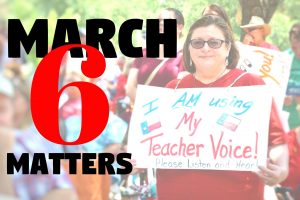Why March 6 Matters: Teacher Pay

Elections Educator Compensation | Benefits
Date Posted: 2/19/2018 | Author: Mark Wiggins
 Early voting begins TOMORROW (Feb. 20, 2018) for the March 6 Texas primary elections, so over the next few days we are taking a look at some of the reasons why it’s so important that educators vote in this election! In this first post in our series, we're taking a closer look at teacher pay.
Early voting begins TOMORROW (Feb. 20, 2018) for the March 6 Texas primary elections, so over the next few days we are taking a look at some of the reasons why it’s so important that educators vote in this election! In this first post in our series, we're taking a closer look at teacher pay.
By now, you’ve probably seen the recent campaign advertisements by Lt. Gov. Dan Patrick regarding pay raises for teachers, which many people believe are laughably disingenuous. This brings us to another important reason for educators to head to the polls this year: the desire for better teacher pay.
The average Texas teacher earned $52,525 in 2016, below the national average of $58,064. Nationwide, average teacher salaries in 2016 ranged from $42,025 in South Dakota on the low end to a high end of $77,957 in New York.
Texas educators have tirelessly advocated for better pay. Each legislative session, pro-public education legislators file bills to raise teacher salaries, while anti-education legislators file bills to eliminate salary minimums. Because of the costs associated with increasing pay across-the-board for more than 350,000 teachers, raises have historically been blocked by legislators who argue schools already get too much state funding. These same legislators are often the ones behind bills that would allow schools to pay less by repealing the minimum salary schedule that functions as a minimum wage for educators.
Recently, some anti-education officeholders have begun to offer lip service in support of raising teacher pay as a means of providing cover for their efforts to defund schools and weaken teachers’ political voice.
Examples of this can be found in the special session of the 85th Texas Legislature. Gov. Greg Abbott, and Lt. Gov. Patrick, and others spent the entire regular session promoting unpopular and harmful voucher programs that would have stripped desperately-needed resources from public schools in order to subsidize private businesses. At the same time, they pushed deeply offensive legislation that singled out educators in an attempt to make it more difficult for them to join professional associations like ATPE. Meanwhile, educators learned that their healthcare costs would soon be going up dramatically.
Faced with withering criticism by outraged educators at the start of the 2017 special session, Gov. Abbott and Lt. Gov. Patrick hastily proposed giving teachers a $1,000 raise – but refused to offer any state funding to pay for it. The Texas Senate quickly whittled the idea down to a one-time bonus, before abandoning it altogether. In the meantime, more serious proposals were left to wither on the vine.
Perhaps ironically for Abbott and Patrick, the ordeal had the rather unintended consequence of galvanizing educators to pursue a meaningful, permanent, and fully-funded increase in teacher pay. Yet the only way such a raise will be successfully passed is if Texas voters elect enough pro-public education legislators willing to prioritize this issue. Otherwise, teacher pay will continue to take a back seat to other issues during future legislative sessions.
Go to the CANDIDATES section of our Teach the Vote website to find out where officeholders and candidates in your area stand on teacher pay and other public education issues. Because voting districts in Texas are politically gerrymandered, most elections are decided in the party primary instead of the November general election. That’s why it is so important to vote in the primary election. Registered voters can cast their ballot in either the Republican or Democratic primary, regardless of how you voted last time.
Remind your colleagues also about the importance of voting in the primary and making informed choices at the polls. Keep in mind that it is illegal to use school district resources to communicate information that supports or opposes specific candidates or ballot measures, but there is no prohibition on sharing nonpartisan resources and general “get out of the vote” reminders about the election.
Early voting in the 2018 primaries runs Tuesday, Feb. 20, through Friday, March 2. Election day is March 6, but there’s no reason to wait. Get out there and use your educator voice by casting your vote TOMORROW!
CONVERSATION
RECOMMENDED FOR YOU

Elections, Miscellaneous, TEA | Commissioner | SBOE, Testing | Accountability, Texas Legislature
06/21/2024
Teach the Vote’s Week in Review: June 21, 2024
STAAR scores continue to generate buzz. Plus, watch this video on upcoming House of Delegates consideration of the ATPE Legislative Program.

02/20/2026
Teach the Vote’s Week in Review: Feb. 20, 2026
Early voting is underway through Friday, Feb. 27. Plus: Check out the brand-new ATPE Mobile App.

02/20/2026
ATPE’s new mobile app brings advocacy tools to your fingertips
Read Teach the Vote, contact your legislators, or donate to ATPE-PAC all on your phone using the new ATPE Mobile App.

